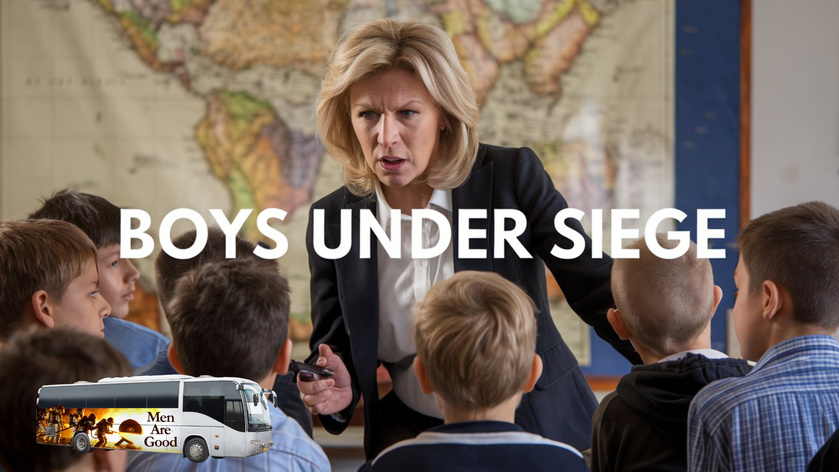
Siege: ""a military operation in which enemy forces surround a town or building, cutting off essential supplies, with the aim of compelling the surrender of those inside."
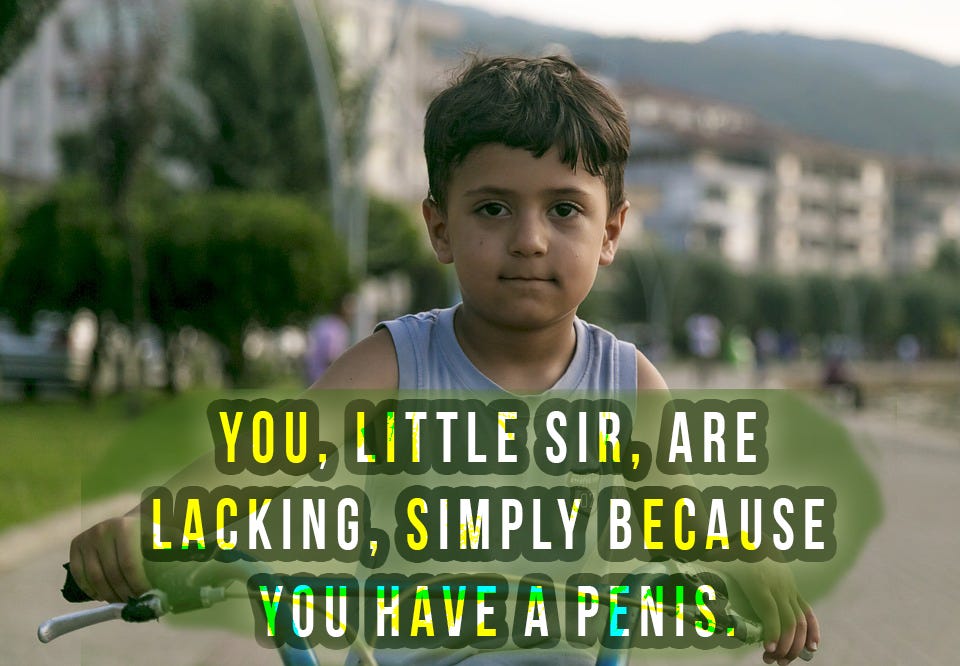
Boys are under attack in schools.
How are they under attack? Well, they learn that:
Their sex has caused the world's problems,
That Men are privileged.
That men are toxic and have oppressed women.
That Men just need to step aside and let women run things, then things would be better.
They learn that Boys are inherently inferior and simply need to try to be more like the girls.
These messages get expressed repeatedly both actively and passively. Often subtle but sometimes blatant. They are unmistakable and are forced upon the boys without any counterpoint or any option for them to challenge or argue. These are the default. To argue would be unheard of. A third grader rarely argues with his teacher. She is queen and only speaks the truth. So boys are forced to shut up and accept the narrative that something is wrong with their sex.
Such hateful and persistent messages are hurtful and abusive to our boys. And yet no one complains.
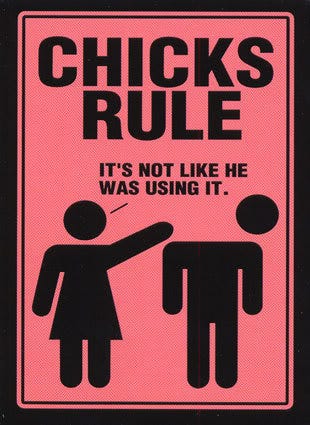
What does it do to anyone who hears a constant drone of negative about their identity? Day in and day out you hear there is something inherently wrong with you. You are helpless since you have no way to respond. What does years of that do to a person?
There are several research driven ideas that help us understand the intensity these messages may have on boys. One is the concept of learned helplessness. In studies, animals have been given negative stimuli repeatedly without any opportunity to escape. After many repetitions the animals simply give up. They stop trying. Many are thinking this could be related to the origin of anxiety or depression. Could a similar principle be at play with boys and their involuntary exposure to hateful messages? It’s not a stretch to see how boys being bombarded with negative messages about their sex are put in a helpless position not unlike the learned helplessness situations. Might there be a cumulative effect?
Another research driven concept is that of the Stereotype Threat. An example of stereotype threat is the idea that girls are exposed to stereotypes when young that claim that girls are not so great at science and math. Some are thinking this early exposure may impact their later disinterest in sciences. Okay. Maybe so. But now think if that is true what sort of huge factor all of the anti-male messages that are being sent to boys might have on him? If the girls are negatively impacted by a minority message that they aren’t as good at math and science just imagine the impact of the multiude of misandrist messages boys receive. What might that do to them? Does anyone care? I don’t think so.
Then there is the element of self fulfilling prophecy. When people hear negative ideas about them it increases the chances that those negatives will come to fruition. Think about all of the negatives boys hear about their sex and just stand back and imagine what impact that might have?
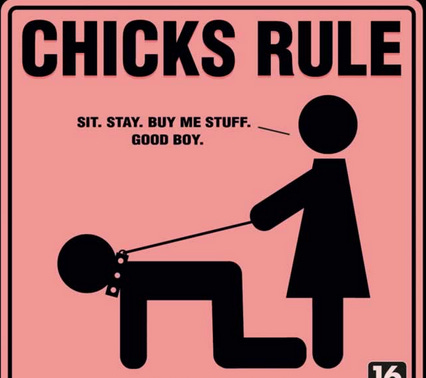
Keep in mind that we know that the brain has great plasticity, that is it can alter itself with the advent of new information. When children are young they are particularly susceptible to negative messages having an impact on their young brains. The research shows us that children who were abused suffer from a lack of myelonization of their axons. Many think that this is one of the causes of depression and anxiety. What they have also found is that physical abuse AND emotional abuse both have the same impact on the brain. Wouldn’t it be easy to characterize the many negative anti male messages that boys receive as being somewhat similar to emotional abuse? One definition of emotional child abuse is “The caregiver refuses to acknowledge the child’s worth.” Seems to me that this is similar to what boys hear every day. The brains of our young are sensitive to stressors. It’s not a big leap to see that having one’s sex be disparaged on a regular basis is indeed a significant stressor.
The messages boys receive are a part of a huge double standard where boys are seen as the problem and girls are seen as the answer. Another frame for double standards towards boys has to do with the issue of violence.
VIOLENCE
Yet another place you see this radical double standard is around the issues of violence. It has been a long standing requirement in our culture to demand boys not hit girls. Yeah, so be it. But in our increasingly feminist drenched schools something started happening more frequently. Girls started hitting boys. And what was the administrative response to this. Nothing. No one lifted a finger. Even when boys had the courage to complain to teachers that a girl had pinched, hit, pushed, slapped, or kicked him he was told to go to his seat and not complain. I have heard many boys say the same thing. When they hit there is immediate punishment, and when the girls hit there is nothing. No one cares.
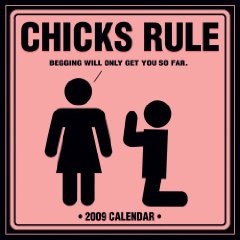
It didn’t take long for some devious girls to realize they could attack whenever they wished. And they did. While most girls would never do such a thing, those who chose to attack under the protection of the gynocentric double standard made the boys lives very difficult. What did the boys learn from this interaction? They learned that You, as a boy, do not deserve protection. Your pain is not important. It’s not as important as the girls. Shut up and quit complaining. Sound like emotional abuse to you? It does to me.
It’s important to note here that though it was a minority of girls doing this, the majority of girls did not call out the perps and would generally say nothing. They were willing to sell the boys down the river and allow the aggressive girls to do their evil.
So how do you think that feels for boys? They likely have superior strength but when attacked they are required to stand down. Pretty tough lesson for a little guy don’t ya think? I wonder sometimes if the situation was reversed how would girls respond? Boys could hit them when they wanted and they could neither complain or defend themselves. If they went to the teacher they would be ignored. Hmmmm I’m guessing they would not handle it so well. I marvel at how the majority of boys have learned to deal with this blatant and hateful double standard.
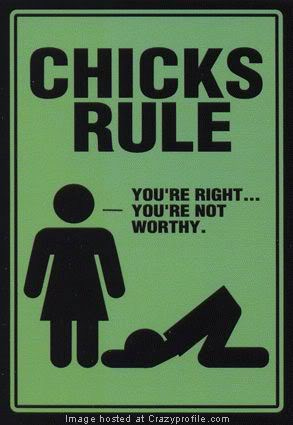
So the boys are getting an early gynocentric message. You better protect girls and you, little sir, are not worth protection. Just shut up and go to war.
I think it is time to allow boys to defend themselves.
If this double standard only happened in schools it might not seem so sinister but this pattern of allowing women’s violence towards men while disallowing men’s violence towards women is a common occurrence in our culture. Just look at the undercover youtube videos showing public reaction to a man being violent towards a female partner. Everyone looks up, many challenge the violence, both men and women, some men come and physically stop the man, some go farther and are violent against the offending man, while others just call the police. But what happens when it goes the other way and it’s the women hitting the men? We see something different, much like the girls reaction to the girl hitting the boy in school, No one gets upset. In fact many people laugh and point. They make fun of HIM. You know, the victim. Can you see how this is the same dynamic we saw in the schools? It’s just played out on a different level.
Possibly the worst example of this double standard is the judicial lenience towards women who have murdered their husbands. You know, she says he abused her so the judge says, well, it’s okay that you killed him. And she gets probation. Try that one the other way around and see how far you get with this horrible double standard. You know the drill.
And to top it off there is yet another level for this hateful double standard of tolerating female violence. Our congress 30 years ago passed the Violence Against Women Act. Notice it doesn’t say violence against people, it ignores men who are victims of female violence and focuses only on the women who are hit by men. Same thing right? Just note that due to this gynocentric pattern we now have over 2000 shelters for women who have been victimized by men but only a handful of shelters for the men. And yes the actual violence of women towards men is nearly equal to that of men. Gynocentrism runs silent and it runs deep.
I have talked with legislators about these double standards and I’ve talked with feminists about this. Both have the same attitudes. We are concerned about men and boys, but… and then fill in the blank. I think the same bullshit responses would come from the people in public places who laughed at the men being victimized. They would not see their own bias and duplicity in such a double standard. They would think they were doing the right thing. And that is just how teachers and administrators respond when questioned about this. But, but, but? We care about boys! You may think that but the evidence says something else.
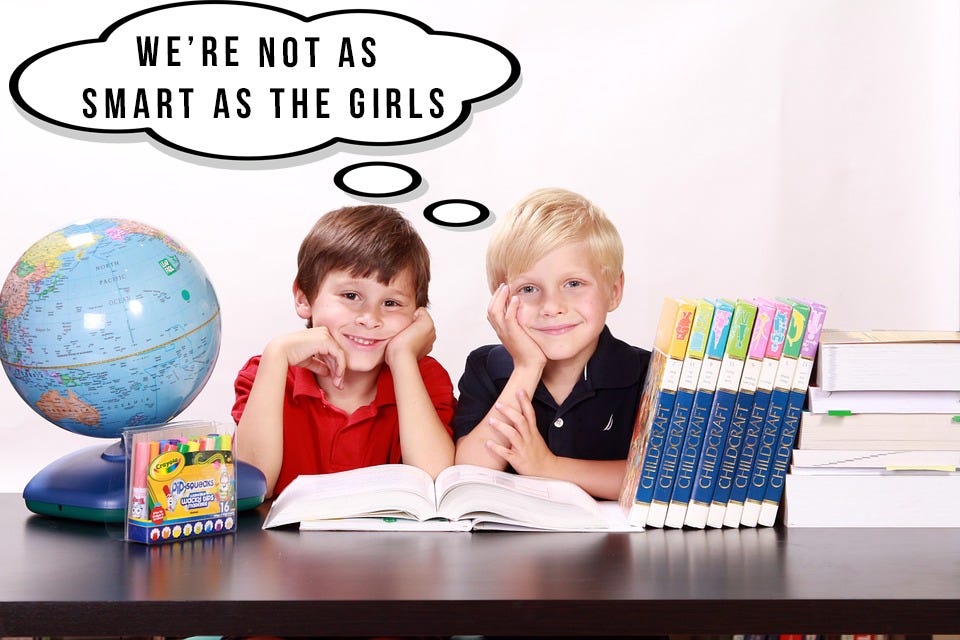
I’d like to bring up one more item related to the double standard before we close. Actually in the next part of this series we will be examining the research that backs up our earlier discussions. One of those studies is particularly vexing. It shows that boys, by the age of seven believe that they are not as smart as girls. It also shows that girls feel they are smarter than boys and come to that conclusion even earlier than the boys(4 years old). Here’s a quote from an article about the study:
"Researchers also found that the children believed adults shared the same opinion as them, meaning that boys felt they were not expected by their parents and teachers to do as well as girls and lost their motivation or confidence as a result."
Somehow, our boys, by the age of 7, get the idea they are not as smart as girls. Why are we not panicking over this? But people, educators and our legislators simply snooze on.
Of course this is not simply a result of our schools but they obviously play a part. How did our children get to the point that they both think boys are not as smart? What messages are they getting and why? I remember when I was in elementary school in the 1950’s. The boys would tell the girls they were smarter and the girls would tell the boys, no, they were smarter. It was all in fun and we all knew that there were some really smart girls and also some really smart boys. We tossed these ideas at each other in the same way we would accuse the opposite sex of having cooties. But somehow now this game has changed remarkably. We now condone crap like “boys are stupid throw rocks at them” we laugh at the “girls rule and boys drool” taunts. And of course, the Future is Female nonsense. Somehow our culture is convincing our children that girls are smarter and they are the solution. This is a problem
Just imagine that the research had found the opposite, that girls and boys both believed that boys were smarter. There would be a national campaign in no time. You likely remember that this was actually the rally cry of feminists to gain millions in funding in the 1990’s, her self esteem is low. Girls didn’t think they were smart. Get her help! Now! But since it is boys, no one cares.
Our schools have become lopsided institutions that favor girls. Girls preferences rule the roost, schools are about everyone getting a trophy, sitting still and about feelings. This is girl-ville. This is not a good place for boys.
And keep in mind that men are good, as are you.


















